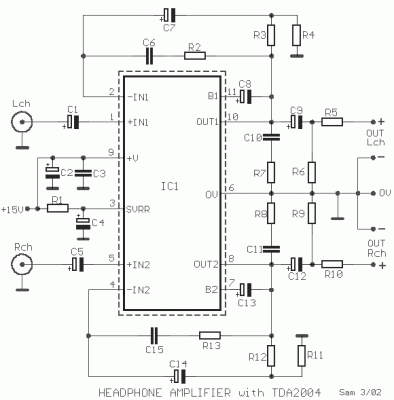- Simple 4 Transistor Hearing Aid Circuit Diagram
- Amplified Ear: Build a Sensitive Sound Amplifier
- Build Your Own 3V Hearing Aid Circuit Diagram
- Studio Stereo Headphone Amplifier Circuit Diagram
- Stereo Headphone Amplifier: Build Your 90mR Circuit
- 427mW Class-A Headphone Amp
- Portable Headphone Amp: Circuit & 3.7V Upgrade
- 100mW Headphone Amplifier Schematic Build Guide
- LME49830 High Power Amplifier Circuit Diagram
- TDA7052 Speech Amplifier Circuit Diagram & Build Guide
- DC-Coupled Audio Amplifier Design: A Practical Guide
- Build a Low-Power IR Audio Amplifier Circuit Diagram
- 8 Watt Audio Amplifier Schematic: Build Your Powerful Project
- 7 Watt TDA2003 Audio Amplifier Circuit Design
- High-Power 60W Audio Amplifier Schematic Design
TDA2004 Headphone Amplifier: Build Your 40dB Power!
Description
A operational amplifier, often referred to as an opamp, is utilized here as a headphone amplifier, capable of driving low-impedance loads. Essentially, it incorporates two separate amplification stages. The voltage gain has been established at 40dB, stemming from the R3-12 and R11-12 resistors, individually for each channel. The bandwidth limitation for each unit is controlled by the combination of R12, C2, and R13, C15, set to 22KHZ. Resistors R5 and R10 are employed for matching the impedance to the earphones. The resistors R6 and R9 function to discharge capacitors C9 and C12, preventing undesirable noise when the headphones are connected directly. This circuit boasts excellent performance characterized by low distortion, minimal noise, and an acceptable frequency response. The circuit’s current demand is approximately 150mA, requiring a power supply of approximately +15V. The IC1, a TDA2004, should be mounted on a suitable heatsink to manage heat dissipation.
TDA2004
The TDA2004 is a compact and versatile audio power amplifier integrated circuit (IC) frequently used in portable audio applications. It’s a dual channel amplifier with a rail-to-rail output, providing high linearity and a broad bandwidth. This IC is particularly suited for amplifying low-power signals in applications such as headphone amplifiers, portable speakers, and small audio systems. It’s known for its efficiency and low distortion characteristics, making it a popular choice for audio enthusiasts and hobbyists. Proper heat dissipation is crucial for optimal performance and longevity of this IC.
Circuit diagram
Part List
- R1=120Kohm
- R2-13=330 ohm
- R3-12=2.2Kohm
- R4-11=27 ohm
- R5-10=22 ohm
- R6-9=1.2Kohm
- R7-8=1.2 ohm
- C1-4-5=10uF 16V
- C2=100uF 25V
- C3-10-11=100nF 100V MKT
- C6-15=3.3nF 100V MKT
- C7-8-13-14=100uF 16V
- C9-12=470uF 25V
- IC1=TDA2004 in Heatsink
